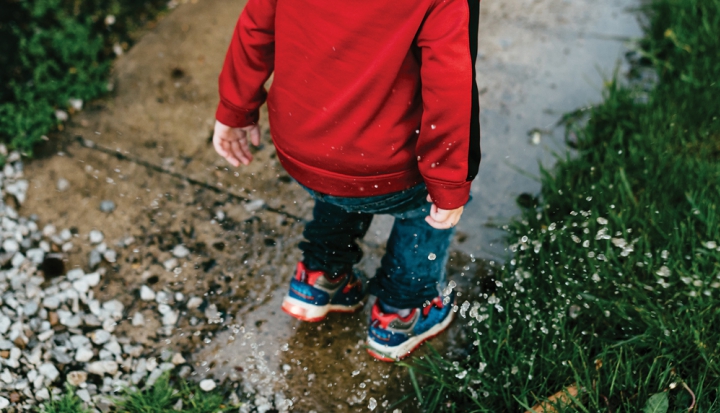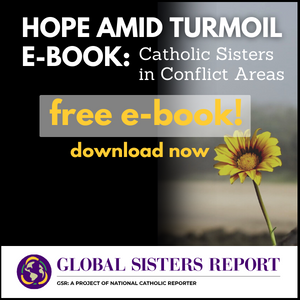In 2012, for baptism preparation, my husband and I brought our 3-month-old son down to a musty church basement where a nun played us a 20-year-old religious videotape. It was hardly rigorous, but gathering with a half-dozen other families representing at least four separate nationalities at this urban church, all of us struggling with but also enjoying our new children, felt right. We were bringing our firstborn child into our family, which in turn all of us in that basement were a part of. The message warmed my heart, despite the video’s dated haircuts and clothes.
For our second child’s baptism preparation three years later, we convened with another clutch of families in a meeting room at a suburban parish. The priest, with a well-meaning smile, quizzed us on what we remembered from scripture. Ask some stressed-out, sleep-deprived parents what they specifically remember from the Bible and you are not likely to get much. The room was filled with awkward silence. I’m sure he didn’t mean it this way, but something about that pop quiz sent the message, If you can’t be bothered to remember, what are you even doing here?
Now that my firstborn is old enough to ask bedtime questions about death and God, the quizzes have continued. “What happens when we die? Will God die? Is heaven scary?” Just like in baptism preparation, I have felt unequipped, ashamed, and even scared by my lack of an answer.
Growing up, my father had an unquestioning faith that I envied but did not share, so it seems insincere to tell my sons, “Just pray, just believe, just trust,” when they have fear and questions. I also learned later in life that my mother went with us to church more as a favor to my dad than for any other reason, which was shocking to hear. I do not want to tell my kids anything about faith now, even anything sweet and simple for kids, that I may later have to walk back.
I began to dread the nighttime questions and realized I needed to get a better handle on what I would tell my children about God. Part of me felt that I ought to just suck it up and get back to church on a regular basis and that “it” (all the answers about God and faith) would magically sink in for my boys. But what if I wanted a deeper connection than to merely suck it up? Also, I knew deep down I wouldn’t just show up to church robotically and receive an epiphany. If I truly wanted to give my children a faith formation that I think will be good for them and for the community, I would have to do some literal soul-searching.
Find a vocabulary and agree to disagree
As with any project, I began with research. The first book that came my way was A Well-Built Faith: A Catholic’s Guide to Knowing and Sharing What We Believe (Loyola Press), by Chicago catechist Joe Paprocki. This was the refresher I didn’t realize I needed, a nuts-and-bolts and happily readable bite-sized refresher on what Catholicism is built on. Malcolm Gladwell once wrote about athletes and the act of choking—how one forgets the fundamentals and how that forgetting is a type of psychological torture. Reading Paprocki’s book I realized I really needed a refresher and that the fundamentals of the faith were not the same as my memories of being an altar server or of youth group retreats.
Marion Hornung, director of religious education at St. Mary of Vernon in Vernon Hills, Illinois, agrees that parents do need some type of refresher when passing on faith. “I think one of the things that gets lost is a type of working vocabulary. You do need to know that,” she says. Brushing up felt empowering, but better yet I would be more prepared the next time my son started asking me about what we believe and why.
I also read Quest for the Living God: Mapping Frontiers in the Theology of God (Bloomsbury) by Elizabeth A. Johnson, C.S.J., which handles in a rational, historical, and lovely way the hurdles of being a modern Catholic in a modern world.
“That’s my big struggle right now,” says Mary Kenyon, a family friend who lives in Iowa City who has also thought long and hard about raising her two sons in the church. “The teachings of Jesus are the kind of things I want to impart to my kids. But the ‘Capital C Church’ is a barrier,” she says. “At some point I’ll have to have a difficult conversation with my kids about how there’s no other organization I’d participate in that doesn’t accept women in leadership.”
Johnson’s book illuminates a path for how to maintain Catholicism in a world of systemic violence against women, racism, and income inequality as well as a greater understanding of science and other major religions. Simply engaging with these questions, acknowledging them, wrestling with them, felt good and more faithful than ignoring them.
I didn’t necessarily come away with any answers, but I was soothed to discover that critical discourse can actually lead us back toward faith. As Paprocki says, “Catholicism reminds us that we are called to love God with our heart, soul, mind, and strength—a synthesis of reason and emotion.” I had internalized the message over the years that if you don’t simply fall in line with Catholic faith, you are not welcome, are not legitimate. I feel now that if we are made to think and reason and question, then we ought to do that and not try to sweep major concerns under the rug. Simply using my mind, trying to get it to talk to my spirit, felt like a tough but good workout.
It was also comforting to feel like I was still allowed to call myself Catholic even when I disagree with the church on some fundamental matters—and that I could share these disagreements with my kids. “Parents have a right to share their opinions with their child,” says Paprocki, who adds, “They also have a responsibility to explain the church’s side of it.”
Hornung agrees that Catholic parents should make sure they know the roots of their criticisms. “I would encourage people to research why or why not we do things in the church. There’s a lack of understanding of the church, its history, and its teaching. If you have that disagreement you have to be responsible for that: Why do you have that and where does that come from? I think knowledge is power,” she says.
In fact, some other young Catholic parents I spoke with actually found a stronger faith community by expressing their concerns with the church. Megan Zander, a journalist and mother of two in New Haven, Connecticut joined her child’s Catholic parent and teacher association, where she could get involved and engage with like-minded parents. “I jumped full in: It’s very progressive,” she says, adding that they have lively conversations about women in leadership and why priests take vows of celibacy. Like me, when she was growing up in the Catholic Church, she felt that it was wrong to ever question church teachings. “It’s nice to feel like there are other people who consider themselves to be Catholic but aren’t afraid to question the religion the way it is right now,” Zander says.
One of the ways Laura Goode, a producer and mother of one in San Francisco, found her way back in the church was by engaging with a Catholic colleague who didn’t fit the mold of what Goode thought a Catholic was supposed to look like. “Here was a white, anti-racist, feminist woman who called herself a practicing Catholic,” Goode says. “That blew my mind! Even more, she didn’t seem ambivalent; these moral planes didn’t seem to conflict to her.”
Goode was also inspired by the woman’s deeds. “I saw her acting out—feeding the hungry, clothing the needy, doing the work,” she says. “That was a lightbulb moment for me.”
Paprocki does not miss the days when the church was an unquestioned authority figure. He recalls his mother inviting his parish’s associate pastor to join on a family swimming trip. “The man was a total jerk. All us kids completely hated him,” he says, but his mother wouldn’t think twice about inviting him to join because of the pastor’s status. “I don’t think it’s healthy for kids to see that unquestioning.”
Paprocki believes that it’s actually good parenting to be transparent regarding your issues with the church. “It presents to your child that you’re a thinking person, that you’re not just swallowing everything in blind faith,” he says.
Accept the mystery
Another difficulty I faced talking to my son about God was that, honestly, I just don’t know sometimes. Iowa mom Mary Kenyon and I agree that we received a Catholic standard of aspiring to be a “true believer” type like our fathers. But we do question. With kids, is it best to fake it ’til you make it? Will it be too confusing to advise children on faith when you’re not always sure what you believe?
Paprocki thinks not. “Honesty is the best policy,” he says, and it’s perfectly fine to tell children, “I’m struggling with some things right now—I’m praying about it.” Rather than stuff doubt and questions down and pretend they don’t exist, Paprocki thinks it’s more empowering to demonstrate a spirit of curiosity and proactiveness. “We have the responsibility to continue to grapple with it, and say ‘I’m doing what I can: I’m doing some reading, I’m talking to someone.’ ” Paprocki says that it does children no favors to say instead, “That’s something I don’t think about.”
Hornung agrees and compares a relationship with the church to that with anyone else we’re close with, in that it has ups and downs. “The reality is, each of us has our own story of faith. It’s in the sharing of the story that we find it,” she says. “I think you need to be honest with your children about going through desert experiences with your faith and where you’ve felt God profoundly.”
This advice echoed with me. I’m not sure when I’ll use it—my 5-year-old cried when I suggested that Wonder Woman is superior to Batman, so I may stick to a simple script for now. However, I think I would have liked hearing from a parent that one’s faith and relationship with God are a long road, one you may veer from or come back to, but is always there if you need it.
Find your community
Simply showing up to church and hoping it clicks isn’t going to create an engaged dynamic for either parents or their children. Ellen Zafonte, the associate director of faith formation at the Diocese of Rockville Centre in New York, says that when young parents return to the church, often via baptism, “There’s a period of time where they wonder, ‘How do I get back in? Where do I go?’ ”
Zafonte recommends seeking a parish with young clergy or Masses specifically for families. She also asks new parents about their earliest memories of the church and family traditions that were meaningful. “What about the holidays at Christmas? My grandmother had this beautiful crèche, and I got to put the baby Jesus in. Do you have a crèche at home? Wouldn’t you like your child to be part of that tradition?”
When church is part of the routine, she advises parents not to merely hope the lessons wash over their kids but to engage. On the drive home from Mass, she suggests parents challenge kids: “I want you to tell me words that stuck in your head that Father said,” and then talk to them. “It’s just conversation and explanation,” she says. “We don’t take them to something different and not explain what it’s about.”
Zafonte also encourages parents to be more engaged with the parish if they’re not finding what they need: “If you take your children to Mass and there’s nothing there, meet with the pastor and say, ‘We need to do something that’s more kid friendly.’ ” Of course the answer may come in the form of a calling. “What the young parents have to realize is that the pastor will turn around, ‘Do you want to organize that?’ ” she says. “That’s how any of us get involved.”
Kenyon is thankful that her parish priest, who joined the priesthood after being widowed in his 50s, “understands family life. He talks about the challenges he and his wife went through raising kids. It’s like a revelation to have a priest who knows that and who has lived it,” she says. Her family also has communed around religious education at home. Once a month or so, Kenyon’s family and another will take turns hosting dinner while the other family leads the lesson. “It will be a story or a social justice theme about kids doing good works, and how it relates to the gospel,” she says. The lesson is written in age-appropriate language and accompanied by illustrations and an activity. “If we happen to get the lesson on a Friday or Saturday and then go to church, you can tell that the kids understand the [gospel reading and homily] more easily,” Kenyon says.
Since beginning this journey, I began making more of an effort to talk about God at bedtime with my son. What is he thankful for? Who does he pray for? I know that these are values I would hope he supports regardless of whether he maintains his Catholic identity in his life. That’s all you can really do.
Kenyon and her husband have agreed that she will allow her children to decide for themselves whether to receive confirmation in high school. “They can choose it intentionally, or say ‘Thanks for the background, but I’m out.’ ” She will be sad if her children take the latter route, but this decision has made her more deeply contemplate the purpose of raising Catholic children. “You still realize the value of having had that in your childhood—understanding the traditions and the stories, the teachings of Jesus. You can see that has a value in your life, so you want to give your kids what you had as a child, something you feel a benefit from in your adult life,” she says.
Seek grace
I learned through this exploration that I don’t need to be the world’s best or most devout Catholic in order to raise my children as Catholic. “When you talk about corporal works of mercy, feeding the hungry, sheltering the homeless, most parents think ‘I don’t have time for that.’ That’s because of what you’re doing every day with your children,” says Paprocki. “Your entire life is corporal works of mercy. We don’t do a good enough job helping parents recognize that God is present in the midst of that daily tedium.”
Did I see this advice as a bit of a convenient rationale not to be as present in church as I probably should? Perhaps. But at the same time, it meant a lot to hear Paprocki offer his own form of mercy. We may not be perfect but we work hard doing the best we can—another value I hope my sons absorb with time.
Meanwhile, my difficulty in choosing how to parent as a Catholic is actually a good sign, according to Hornung. “It’s scary in a good way,” she says. “It’s like that jittery feeling you have when you fall in love.”
Being a Catholic, or exploring God, is not about unshakeable blind faith. It’s about embracing and acknowledging the mystery, engaging with it, questioning it, and living with it. Paprocki couldn’t give me a script to utilize when my son asks about death and God but reassured me that it was OK not to know—and let my children know that.
“You can say, ‘I’m not sure I know what to say, but you’re really onto understanding that life has lots of questions involved,’ ” he says. Instead of there being one correct answer to give kids, he says, questions from children about God are a prompt to “explore the vast mysteries, and you certainly don’t want to squelch that: You want to give it its due.” Paprocki says the question of being a Catholic parent is not about having the answers but wondering, “How do we help our children to be comfortable exploring the vast mysteries of life?” The answer is by exploring it ourselves.
This article also appears in the December 2017 issue of U.S. Catholic (Vol. 82, No. 12, pages 12–17).















Add comment